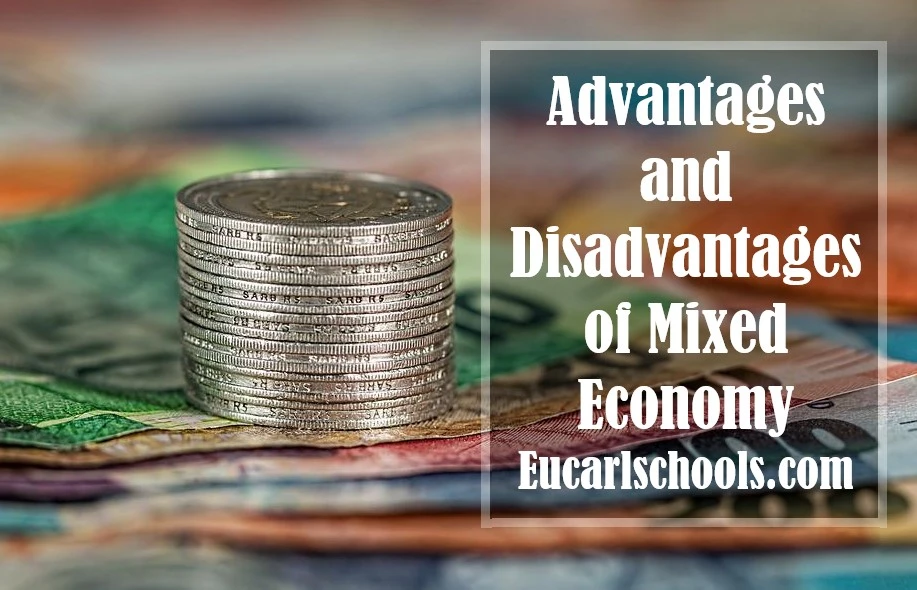5 Advantages and Disadvantages of Mixed Economy
Advantages and Disadvantages of the Mixed Economy
In spite of any personal or even political tendencies for a capitalist or socialist economy, it appears as though every country in the world including the richest countries of the world actually practices a mixed economy.
This system contains some elements of the free market, characteristic of a capitalistic economy, blended with certain socialistic ideologies, to create an outcome that sits perfectly between private ownership and control of production leaving the government to maintain an oversight role by requiring certain forms of regulation.
You could also say that a mixed economy could be in anywhere on the range between pure capitalism and pure socialism. It is this that informs some governments to hand over certain aspects of the economy to some private institutions.
Economists many are actually of the opinion that a mixed approach could well be less efficient than a completely capitalist market, but, it must be said that this proves to be of great advantage to the consumer in the long run. The advantages and disadvantages of the mixed economy are important to review consistently because this would in so small way help to measure economic growth in any nation.

Advantages of Mixed Economy
A mixed economy ensures the proper distribution of goods and services where they are needed. Most mixed economies keep within their fabric the characteristics of the conventional economic approach. These said traditions don’t end guiding the citizens as they many times aren’t aware of what they are doing.
There is a greater chance for equality in mixed economies. This is because the private sector is saddled with the responsibility of making these goods and services available whilst the public sector concerns itself with putting the right infrastructure in place which includes, good roads and a better transportation network. With this powerful synergy, economic development is all but guaranteed for every citizen.
Employment opportunities in a mixed economy abound. In a purely socialistic setup, there are also many such opportunities, but they are not potent enough to drive national change. Whilst in a purely capitalist economy, the rat race to earn more money than the other creates an unhealthy distribution of wealth.
The mixed economy affords many people a second opportunity to go at it again. This can never be seen in a purely socialist or even capitalist economy. For instance, if someone falls into an entirely capitalistic economy, then that person is at a greater chance of plunging into poverty or altogether never recovering from that loss. However, it is quite possible to wind up in poverty in a mixed economy, but, there is a lifeline in the shape of access to resources to reverse the bad turn.
In a mixed economy, the monopoly over goods and services is broken down. This means that the minority is not controlled by the whimsical desires of the majority.
The regulations established in a mixed economy prevent companies from exploiting their workers or creating unsafe working conditions. This means that changes in prices are only affected when the right procedures are followed through.
Disadvantages of the Mixed Economy
The less-competitive ones are cut out of the wealth distribution chain. The while middle-class struggle doesn’t go away because those who are unable to take advantage of the provisions of the public sector through their creativity are still left at the risk of heading down the poverty hole.
The mixed economy concept with the many advantages it has, unfortunately, doesn’t eliminate the creation of monopolies.
At the heart of the mixed economy, is the sole decision of the government to call the shots on which structures would be developed to favor certain industries of the private sector. This swiftly morphs into monopolies and the trend of unequal distribution of wealth persists.
The burden of taxation is heightened in mixed economies.
In a typical mixed economy, the public sector which is the government is burdened with the responsibility of providing every necessary structure that would foster the production of goods and services by the private sector. One way the government eases this enormous burden is through taxation.
This at first could be good if the private sector can realize enough profits that offset the taxes they make, and, if not, discouragement sets in, and there is a general lack of interest to continue such payment of taxes.
It remains within the remits of the authority of the state to switch from a mixed economy to a purely socialist or capitalist economy.
In a mixed economy, ruling governments can decide to change their minds as to what they feel is the best in terms of economic policies. This can turn back to haunt a nation as a country where there is no specific codifications in the constitution against this as this can ensure that there is no stable economic growth.
In a mixed economy, there can be unfavorable sponsoring of selfish economic interests.
The partnership between the government and the private sector which was once full of advantages can devolve into a market where each party tries to lobby the other. Profitable industries can lobby the state to have more tax subsidies, breaks, and some other financial considerations.
Even the government can lobby thriving businesses to perform in specific ways through contracts in the form of creating specific employment opportunities and revenue generation alternatives, in this way, the state controls the way some businesses behave in the economy.
Read Also: Functions and Powers of the Executive
Conclusion
It seems as though even down to the days of entire communism, a mixed economy was still the dominant economic system at play in each country. Even dictators still employ this approach.
Tyrants have urged their nations to approve the usage of these principles contained in mixed economies. You are left with the nagging question of why has no one ever talked about it till now?
It is only simply because the purist approach of capitalism or socialism has failed to work. The pure capitalistic system majored on the accumulation of wealth by the majority at the expense of the minority, while the socialist efforts produce what is good for all without a focus on the quality of what is being churned out.
A fine blend of the two economic systems to an extent needs to occur to produce consistent results. An evaluation of each economic system reveals extremes on both sides, but, a combination of the two could bode an advantageous compromise.






